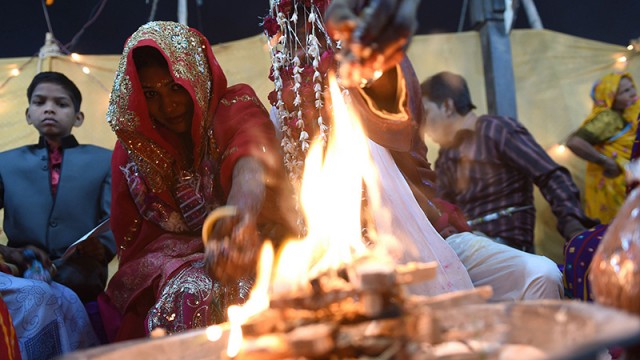The Sindh Hindu Marriage Bill 2016 – What About Hindu Pakistanis Of Other Provinces?
In spite of the fact that the Constitution of Islamic Republic of Pakistan recognizes Hindus as equal citizens, however it fails to recognize equivalent rights in matrimonial unions. The Muslim Family Laws Ordinance 1962 gives complete family laws for Muslims while the Christian Marriage Act 1872 gives an outdated legitimate cover to the marriage unions of Christians. Be that as it may, the Hindus in Pakistan have lived with no legal umbrella of family laws for as long as six decades, until Sindh Assembly broke the ice by passing a new law. The Sindh Assembly has made a milestone leap by passing the Hindu Marriage Bill 2016. Millions of Hindus living in province of Sindh now can prove their marital unions.
This Bill is a sign of relief for Hindus in Sindh since without such law they were not able to prove their marital unions and were consequently being confronted with physical attack, assault and forcible marriage by the hands of feudal masters. Sindh is a well known place for feudals and waderas and the Hindu minority here has been the victim of intense human rights infringements since 1970.
In spite of the fact that the circumstance has changed for Hindus in Sindh, yet at the same time for 2 million Hindus of other provinces, there is no authoritative document to prove their marital unions, which brings about many issues while trying to acquire CNICs and passports, and inheritance or dissolution of marriage.
A Hindu Marriage Bill was presented in the national gathering by Dr Vankwani and another PML-N MNA Dr Darshan in 2014, yet there has been no advancement.
So if I say that if Justice Rana Bhagwandas is requested to prove his marriage and the authenticity of his six kids in court, he wouldn’t be able to.
The issue is that if this lacuna has been existing since the founding of Pakistan, then how exactly has the Hindu community been securing its marriage unions from that point forward?
Interestingly without codified laws, the Special Marriage Act 1872 has been assisting the Hindu community, but which gives sketchy guidelines to registration of marital unions of all minority religions. Individuals from the Hindu group have three alternatives to have their marital unions recognized:
- The local panchayat,
- The Pakistan Hindu Council and,
- The local Union Council.
Numerous Hindus, from Bheel and Meghwar groups, get to sign an affidavit before an oath commissioner to prove their marital unions.
The National Database Registration Authority (NADRA) had additionally started registration of marital unions. Registration with the panchayat and the Pakistan Hindu Board is simple, yet with regards to NADRA and the Union Council, the procedure is a genuinely hard test. Despite the fact that the Supreme Court had asked NADRA to register the marital unions of the Hindu group and encouraged the issuance of CNIC, yet the certification itself is brimming with many issues, for instance the terms used are nikah rather than shadi, nikahkhwan rather than maharaj or pundit, and other such mistakes.
Registration with pundits and panchayats don’t have any lawful grounds to prove the marriage. The issue has been further aggravated with the devolution of religious and minority issues to the provinces. The provinces now will need to independently order individual laws for minority groups to give legal cover to marital unions and separations. After the Eighteenth Amendment to the Constitution, the issues of religious minorities and their family matters have become provincial subjects, however the Assemblies of Balochistan and Khyber Pakhtunkhwa have passed the authority to the federation to enact Hindu marriage law. A similar resolution is pending in the Punjab Assembly.
The main highlights of Sindh Hindu Marriage Bill 2016 are as follows:
- The bride and groom cannot be less than 18 years of age, according to the text of the approved draft.
- Married couples will be required to obtain a marriage registration certificate, while a couple can also face fines in case their marriage is not registered. The law can be applied retroactively to existing marriages.
- Zoroastrians and Sikhs will also be able to register their marriages under the new law.
Many are seeing the passage of the Bill by Sindh Assembly as a ray of hope. I hope this Bill may soon get adopted nationwide as sadly it is still pending for consideration in the National Assembly, Islamabad.
The views expressed in this article are those of the author and do not necessarily represent the views of CourtingTheLaw.com or any other organization with which she might be associated.


